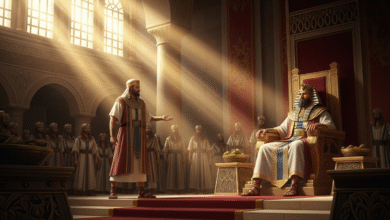The story of Joseph, peace be upon him: From the Well to the Throne Lessons in patience and divine empowerment

In the annals of Quranic stories that transcend time and space, the story of Joseph, peace be upon him, shines as a unique jewel, not just a narrative of events and characters, but a deep faith epic, rightly known as the“best stories” in the Book of God. It is a story that carries with it priceless lessons in beautiful patience that is not tainted by panic, pardon when able, which transcends the desire for revenge, and reveals the wisdom of divine trials that turn great adversities into great blessings. From the darkness of a deep well to the darkness of a prison, and then to the throne of a great king, the hand of divine power is evident, which manages the matter, transforms fate, and exalts those who are patient and pious, so that people know that God’s plan is the greatest good, even if it is hidden from the eyes.
Envy of brothers: The Spark of Destiny and the Beginning of the Great Tribulation
The story of Joseph, peace be upon him, began with the good news of a dream he had as a young boy, in which he saw eleven planets, the sun and the moon prostrating to him. This vision was a sign of a great future awaiting the boy. Joseph told his vision to his father Jacob, peace be upon him, who, with his prophetic insight and knowledge of interpretation of visions, realized that his son would have a great status and a high position, and that God would continue to bless him with prophethood and kingship. But Jacob, a wise father, advised his son not to tell this vision to his brothers, for fear that it would arouse envy and jealousy in them, and they would plot a scheme that would harm him.
Evidence: The Qur’an mentions this first dialog, which was a prelude to the ordeal, in Surah Yusuf:
إِذْ قَالَ يُوسُفُ لِأَبِيهِ يَا أَبَتِ إِنِّي رَأَيْتُ أَحَدَ عَشَرَ كَوْكَبًا وَالشَّمْسَ وَالْقَمَرَ رَأَيْتُهُمْ لِي سَاجِدِينَ (4) قَالَ يَا بُنَيَّ لَا تَقْصُصْ رُؤْيَاكَ عَلَىٰ إِخْوَتِكَ فَيَكِيدُوا لَكَ كَيْدًا ۖ إِنَّ الشَّيْطَانَ لِلْإِنسَانِ عَدُوٌّ مُّبِينٌ (5)
(Surat Yusuf: 4-5).
Unfortunately, envy had already taken hold of the hearts of his brothers (except for his brother Benjamin). They saw that their father Jacob favored Joseph and his brother more than them, even though they were older and more powerful. They gathered and devised a diabolical plot, agreeing to get rid of him by throwing him into the deep well of the mountain so that some car (travelers) would pick him up and take him away from them. They tricked their father and asked to take Yusuf with them to play and have fun, and after much insistence, Ya’qub agreed, feeling anxious and worried.
The brothers carried out their crime, throwing Joseph into the well as a small child, then returned to their father with Joseph’s shirt stained with the blood of a lie (they slaughtered a sheep and stained Joseph’s shirt with its blood), falsely claiming that the wolf had eaten him. Jacob was deeply saddened and knew that they were lying, but he could not help but be patient and entrust his affairs to God, and he continued to hope for Joseph’s return, never losing faith in God’s ability and wisdom.
From the darkness of the well to the test of chastity in Aziz’s palace: The constancy of prophecy
A few days later, a trade caravan heading to Egypt passed by the well. They sent their bartender to fetch water, and when he dropped his bucket, Joseph got attached to it and came out with the bucket. They sold him cheaply in the slave market in Egypt. Thus, Joseph went from the cruelty of his brothers and the darkness of the well to the palace of Aziz of Egypt (its minister), where he was bought by Aziz and his wife Zuleikha (Aziz’s woman), and Joseph grew up in a completely different environment, an environment of luxury and wealth, but it was fraught with great temptation.
In Aziz’s palace, Joseph grew to manhood, and God had given him wisdom and knowledge, and made him beautiful. Here, Joseph was subjected to a great test of his chastity, purity and faith. The woman, Zulekha, after closing the doors tightly, courted him and tried to seduce him in various ways and means. But Yusuf, peace be upon him, with his firm faith and piety, refused to give in to sin, and took refuge in God.
Evidence: The Qur’an depicts this difficult situation that emphasizes Joseph’s chastity and purity in Surah Yusuf:
وَرَاوَدَتْهُ الَّتِي هُوَ فِي بَيْتِهَا عَن نَّفْسِهِ وَغَلَّقَتِ الْأَبْوَابَ وَقَالَتْ هَيْتَ لَكَ ۚ قَالَ مَعَاذَ اللَّهِ ۖ إِنَّهُ رَبِّي أَحْسَنَ مَثْوَايَ ۖ إِنَّهُ لَا يُفْلِحُ الظَّالِمُونَ
(Surat Yusuf: 23).
Joseph was tempted to do what might be expected of a human being, but God’s infallibility and steadfastness kept him in check. When the woman of Aziz was exposed after a witness from her family testified to his innocence, she threw him in prison unjustly and falsely, despite their knowledge of his innocence, in order to exonerate herself and save her face in society.
Prison: A Station of Dawah and Empowerment with Knowledge
Yusuf entered prison innocent, with no guilt other than his chastity and purity. He did not despair or weaken, but used his time in prison as a platform to preach the call to God and spread monotheism among the prisoners. God gave him the knowledge of interpreting visions, a great blessing that was not known at the time except to a few. He interpreted the visions of the bartender and the baker who were with him in prison, and told them what would happen to each of them, but he did not forget to call them to pure monotheism, taking advantage of the opportunity to ask them about the interpretation of the vision.
Evidence: In Surah Yusuf, he calls the two prisoners to Allah before interpreting the vision:
يَا صَاحِبَيِ السِّجْنِ أَأَرْبَابٌ مُّتَفَرِّقُونَ خَيْرٌ أَمِ اللَّهُ الْوَاحِدُ الْقَهَّارُ (39) مَا تَعْبُدُونَ مِن دُونِهِ إِلَّا أَسْمَاءً سَمَّيْتُمُوهَا أَنتُمْ وَآبَاؤُكُم مَّا أَنزَلَ اللَّهُ بِهَا مِن سُلْطَانٍ ۚ إِنِ الْحُكْمُ إِلَّا لِلَّهِ ۚ أَمَرَ أَلَّا تَعْبُدُوا إِلَّا إِيَّاهُ ۚ ذَٰلِكَ الدِّينُ الْقَيِّمُ وَلَٰكِنَّ أَكْثَرَ النَّاسِ لَا يَعْلَمُونَ (40)
(Surat Yusuf: 39-40).
Joseph remained in prison for a few more years, waiting for relief from God, knowing that God is in control, and that every adversity is a path to a blessing. Until the day came when the king needed someone to interpret his miraculous vision, which all the priests and soothsayers were unable to do.
Empowerment in the land: From the darkness of prison to the throne of Egypt
When everyone was unable to interpret the king’s vision (seven fat cows eaten by seven lean cows, seven green and one dry), the bartender who came out of prison remembered Joseph (peace be upon him) and his ability to interpret visions. He went to him in prison and told him the king’s vision. Yusuf, peace be upon him, interpreted the vision accurately and knowledgeably, that years of prosperity and fertility would be followed by years of hardship and drought, and advised the king of a wise plan to manage the coming crisis, by collecting crops in the prosperous years and storing them for use in the dry years.
The king was impressed by Joseph’s wisdom, knowledge, and intellect, and realized his innocence of the charges for which he had been imprisoned. He released him from prison and made him the Aziz of Egypt (Minister of Treasury and State Finance), placing all the country’s resources under his management.
Evidence: The Almighty said, explaining this divine empowerment of Yusuf in Surah Yusuf:1
وَقَالَ الْمَلِكُ ائْتُونِي بِهِ أَسْتَخْلِصْهُ لِنَفْسِي ۖ فَلَمَّا كَلَّمَهُ قَالَ إِنَّكَ الْيَوْمَ لَدَيْنَا مَكِينٌ أَمِينٌ (54) قَالَ اجْعَلْنِي عَلَىٰ خَزَائِنِ الْأَرْضِ ۖ إِنِّي حَفِيظٌ عَلِيمٌ (55) وَكَذَٰلِكَ مَكَّنَّا لِيُوسُفَ فِي الْأَرْضِ يَتَبَوَّأُ مِنْهَا حَيْثُ يَشَاءُ ۚ نُصِيبُ بِرَحْمَتِنَا مَن نَّشَاءُ ۖ وَلَا نُضِيعُ أَجْرَ الْمُحْسِنِينَ (56)
(Surat Yusuf: 54-56).
Thus, God empowered Joseph to manage Egypt’s economic affairs and save the country from certain famine thanks to his management and the knowledge that God had given him.
Meeting brothers and the great pardon: The culmination of beautiful patience
After years of prosperity and then the beginning of the drought years that affected the region, Joseph’s brothers came to Egypt to bring supplies and food, as they had heard that the Aziz of Egypt was selling food at a fair price. Yusuf recognized them when he saw them, but they did not recognize him, as his appearance and status had changed. After several encounters, tests, and revelations of intrigue, Joseph revealed his true identity to them.
This is where the story culminates in the most amazing display of forgiveness. After all the envy, intrigue, throwing him into the well, and selling him as a slave, Joseph did not retaliate against them. He forgave them with a pure heart, forgave their mistakes, and asked God to forgive them.
Evidence: Yusuf said to them, forgiving and transcending:
قَالَ لَا تَثْرِيبَ عَلَيْكُمُ الْيَوْمَ ۖ يَغْفِرُ اللَّهُ لَكُمْ ۖ وَهُوَ أَرْحَمُ الرَّاحِمِينَ
(Surat Yusuf: 92).
Then he was reunited with his father Jacob, his mother and his brothers in Egypt, and his vision that he had seen in his youth was fulfilled, as they prostrated themselves to him, not as a worshipful prostration, but as a prostration of reverence and honor for his status.
Conclusion: Wisdom and lessons from “The Best Stories”
The story of Joseph, peace be upon him, is rightly considered the “best of stories” because of its deep wisdom and lessons that are repeated in the lives of people throughout the ages. It teaches us fundamental lessons in:
- Beautiful patience: How pain, sorrow, separation, and injustice turn into a great joy and divine empowerment when patience is coupled with complete trust and absolute reliance on God.
- Chastity and purity: Remaining steadfast to the principles and values of faith in the face of the strongest temptations and temptations, and that God protects His faithful servant.
- Forgiveness when able: A great value in overcoming harm, rising above revenge, and building bridges of mercy and reconciliation even with those who have been wronged.
- The wisdom of affliction: How trials and tribulations in a believer’s life are only ways of preparation, promotion in grades, and the divine empowerment that comes only after great adversity.
- The certainty of God’s promise and providence: How God’s providence for man is greater and more comprehensive than man’s providence for himself, and that the happy ending and the sure relief are for the pious and patient who trust in God’s destiny and wisdom.
- The importance of knowledge and wisdom: How the science of interpreting visions, and wisdom in managing crises, led to Joseph’s survival and empowerment.
The story of Yusuf (peace be upon him) is a message of hope for every afflicted person, and a clear proof that Allah does not lose the reward of those who do well, that relief inevitably comes after adversity, that all good comes from Allah, who alone is the mastermind of all things, and that a good ending is always for the pious and patient.
What is the most important lesson that the story of Joseph left you with after reading it in detail?




